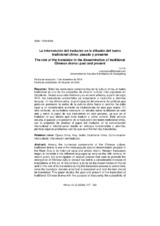Mostrar el registro sencillo del ítem
La intervención del traductor en la difusión del teatro tradicional chino: pasado y presente
| dc.contributor.author | Liu, Liu | |
| dc.date.accessioned | 2022-11-09T09:01:25Z | |
| dc.date.available | 2022-11-09T09:01:25Z | |
| dc.date.issued | 2020 | |
| dc.identifier.issn | 1579-9794 | |
| dc.identifier.uri | http://hdl.handle.net/10396/24302 | |
| dc.description.abstract | Entre los numerosos componentes de la cultura china, el teatro tradicional es uno de los proyectos de difusión cultural más populares en Occidente. Debido a su valor histórico y su encanto artístico, a partir del siglo XVIII, los traductores occidentales ya empezaron a traducirlo a distintas lenguas. En los últimos años, la promulgación de una serie de políticas que procuran promover la salida de la cultura china hacia el exterior ha dado lugar a un considerable aumento de traducciones de esta joya teatral. En este contexto, se considera necesario un estudio sobre la difusión de este arte y sobre el papel de sus traductores en este proceso, ya que es el traductor el que decide qué texto traducir y cómo verterlo. Este artículo estudia el pasado y el presente de la traducción del teatro tradicional chino, con el propósito de analizar el papel del traductor en la comunicación intercultural e intertemporal desde un enfoque funcionalista y además, plantear algunos problemas con los que se enfrentan los traductores. | es_ES |
| dc.description.abstract | Among the numerous components of the Chinese culture, traditional drama is one of the most popular cultural dissemination projects in the West. Due to its historical value and artistic charm, Western translators began to translate it into different languages as early as the 18th century. In recent years, the promulgation of several policies that seek to promote the emergence of Chinese culture abroad has led to a considerable increase of translations of this art. In this context, a study on the dissemination of this art and on the role of its translators during the translation process is convenient, since the translator decides what text is translated and how the text should be translated.This paper studies the past and present of the translation of traditional Chinese drama with the purpose of discussing the subjectivity of the translator in intercultural and intertemporal dissemination from a functionalist approach, and also, the problems faced by the translators. | es_ES |
| dc.format.mimetype | application/pdf | es_ES |
| dc.language.iso | spa | es_ES |
| dc.publisher | UCOPress | es_ES |
| dc.rights | https://creativecommons.org/licenses/by/4.0/ | es_ES |
| dc.source | Hikma 19(2), 117-133 (2020) | es_ES |
| dc.subject | Ópera china | es_ES |
| dc.subject | Xiqu | es_ES |
| dc.subject | Teatro tradicional chino | es_ES |
| dc.subject | Comunicación intercultural | es_ES |
| dc.subject | Intervención del traductor | es_ES |
| dc.subject | Chinese Opera | es_ES |
| dc.subject | Traditional Chinese Drama | es_ES |
| dc.subject | Translator’s Intervention | es_ES |
| dc.subject | Intercultural communication | es_ES |
| dc.title | La intervención del traductor en la difusión del teatro tradicional chino: pasado y presente | es_ES |
| dc.title.alternative | The role of the translator in the dissemination of traditional Chinese drama: past and present | es_ES |
| dc.type | info:eu-repo/semantics/article | es_ES |
| dc.relation.publisherversion | https://www.uco.es/ucopress/ojs/index.php/hikma/index | es_ES |
| dc.rights.accessRights | info:eu-repo/semantics/openAccess | es_ES |

